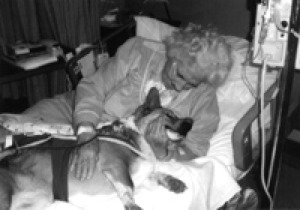 AIRMONT, N.Y. — When Micky Niego knew she had to go out in public, the fear and stress could bring on a severe asthma attack. “I was determined to be functional but didn’t know how until somebody bought me a dog,” says Niego, who is now 45.
AIRMONT, N.Y. — When Micky Niego knew she had to go out in public, the fear and stress could bring on a severe asthma attack. “I was determined to be functional but didn’t know how until somebody bought me a dog,” says Niego, who is now 45.
For the past 11 years, Niego has had a service animal to help her cope with her fears. The passage of the Americans with Disabilities Act in 1991 broadened the definition of disabled to include mental as well as physical handicaps. The act has made a tremendous difference to Niego, who now trains service animals at her business, Metropolitan Service Dogs. “I haven’t taken asthma medication in about four years, and I can’t remember the last time I had an attack,” she says.
According to Susan Duncan, coordinator of the Delta Society’s National Service Dog Center, there have been increasing numbers of calls for service animals for people with mental illness, and anecdotal evidence supports the benefit of service animals for many such people. “They require less medication, make fewer visits to the doctor, show improvement in functional independence, and have better compliance with prescribed medical regimens,” says Duncan. “The security feeling that the animals provide is really across the board.”
Some owners train their own pets to become service animals, others need or prefer a professional trainer, such as Niego. “I make a list for my clients on what it is to live with a dog. Some are starting at ground zero with a new animal, and others have had their pet for a while and it just needs the fine polishing to become a service animal. I’d never put a dog in a home without consulting a health professional first, to be sure the client is able to care for the animal.”
 Although there are no national standards for training service animals, the Delta Society has just been funded to write a curriculum to train people to become service dog trainers.
Although there are no national standards for training service animals, the Delta Society has just been funded to write a curriculum to train people to become service dog trainers.
The Delta Society was founded in 1977 to help people improve their health, independence and quality of life, and has many programs which focus on service animals assisting people with disabilities. “The law (the Americans With Disabilities Act) says that certification or standards cannot be required for the purposes of public access for service animals,” explains Duncan. “That means, if you take a service animal into a grocery store, they can’t ask to see papers. But the animal can’t interfere with the customers or the proper running of the business. It is our hope that within the system of trainers, there will be voluntary standards upheld,” says Duncan.
“I heartily encourage my clients to identify their animals as service dogs, with a distinctive harness or vest,” says Niego. Duncan says that based on a two-year-old survey of organizations that are members of the Delta Society, there are upwards of 16,000 animals being used for emotional support. “That’s a very soft number. The survey didn’t include private trainers and people who train their own animals, just professional training organizations. Its also just dogs,” Duncan notes.
Niego tells another success story. “I consulted with one woman in Maine who had a mouse for a service animal,” she says. “She would be an absolute wreck if she had to go out. But as long as she had her mouse in her pocket, she could leave the house with confidence.”
The Delta Society offers technical assistance on legal issues, educational materials, advocacy services, and referrals for people looking for service animals. For more info, check out their website, www.deltasociety.org.



















